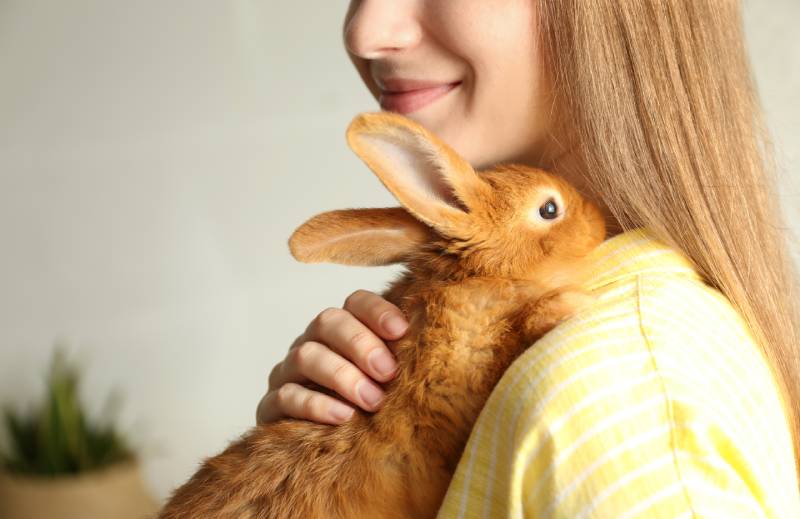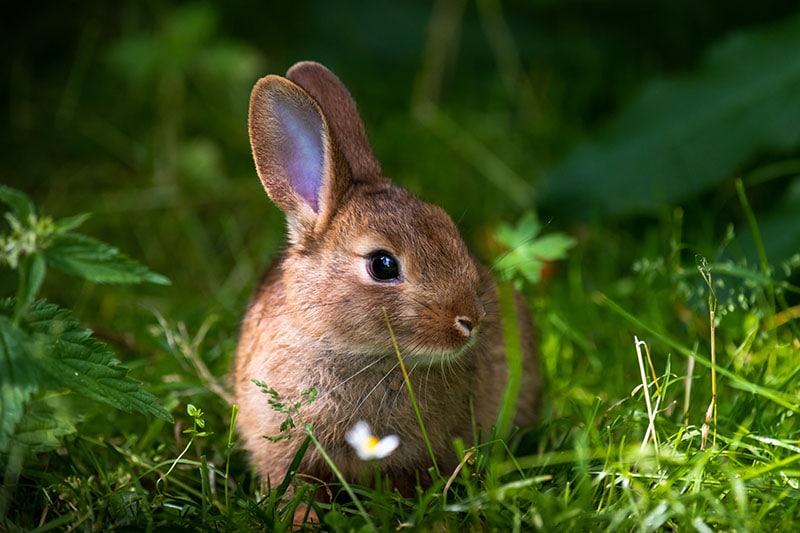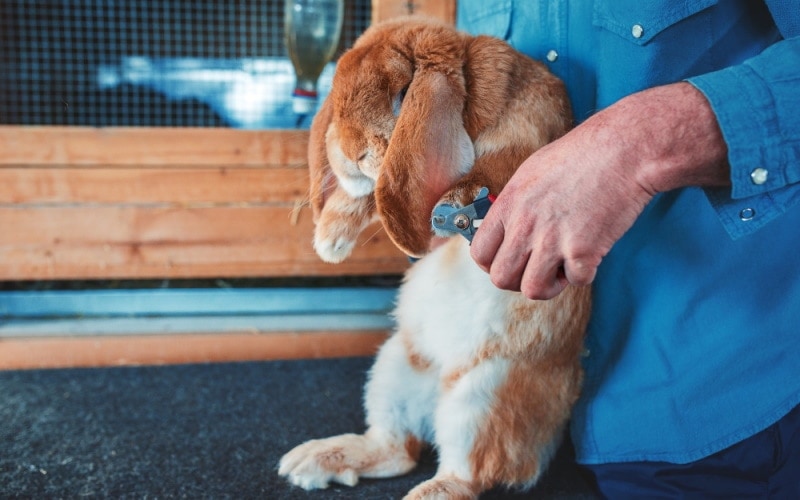Lionhead Rabbit: Pictures, Care Guide, Lifespan & Traits

Updated on
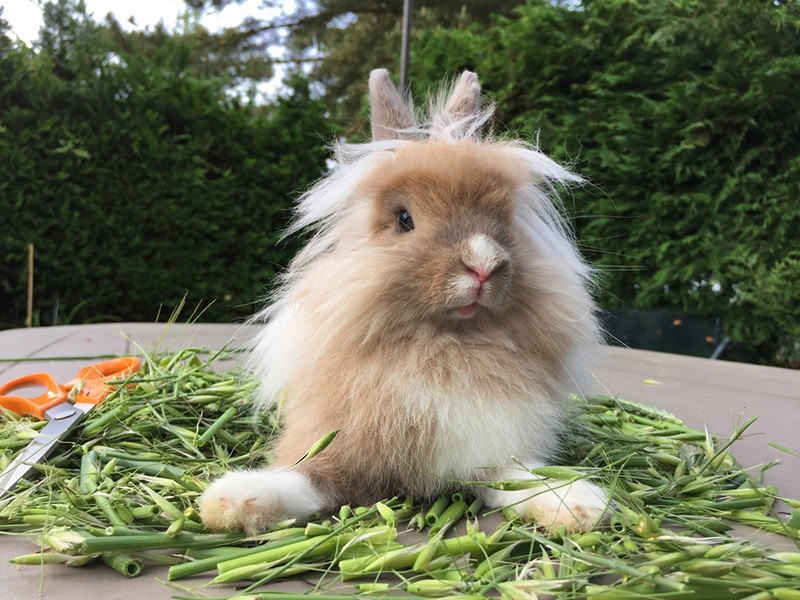
Click to Skip Ahead
The Lionhead rabbit is a small, adorable breed whose unique appearance inspired its name. Rabbits are loved for their low-maintenance needs and heart-warming, cuddly bodies. If that’s your reason for adopting a rabbit for a pet, the Lionhead will provide that and much more.
This relatively new breed, with a mane of fur that adorns its neck, has gained popularity recently. Lionheads make wonderful pets and will steal the show if a show rabbit is what you are looking for. If a Lionhead rabbit is on your radar, read on to learn all there is to know about this cuddly companion.
| Size: | Small |
| Weight: | 2.5 – 3.5 pounds |
| Lifespan: | 7 – 10 years |
| Similar Breeds: | Mini Rex, Angora, Lop-eared Rabbit |
| Suitable for: | Singles, couples, families with children, show rabbit |
| Temperament: | Sociable, playful, good-natured, intelligent, can be skittish |
Lionhead rabbits were first created in Belgium and are a fairly new breed in the United States. They were created by crossing two dwarf-sized breeds—the two breeds used are still debatable, but it is said that they were a Netherland Dwarf Rabbit and a Swiss Fox. However, whichever breeds were crossed created the distinguished lion-like mane of wool around their heads and sometimes the flanks. This wooly mane is unique to the Lionhead Rabbit and makes them one of the cutest and most popular breeds.
Lionhead Rabbit Characteristics
How Much Do These Rabbits Cost?
The cost of a Lionhead rabbit will depend on its quality, age, and where you adopt it. Fortunately, it is a popular breed and is relatively easy to find. You can expect to pay $20–$125, with an average cost of about $50. However, you can expect to pay more for show-quality rabbits from a reputable breeder. A pedigree rabbit is not required if you want one as a pet, but if you are considering breeding them, you should purchase the best quality rabbit you can afford.
You can find a Lionhead at a pet shop, but we recommend going through a reputable breeder that can provide information on its history, health, and temperament. In addition to the cost of the rabbit, you will need to account for the set-up costs, which will include housing, bedding, toys, and food.
Also, you will have ongoing monthly costs such as food, bedding, and veterinary care. On that note, it’s essential to see if you have a vet nearby that works with rabbits to ensure your pet can receive emergency care and routine check-ups.
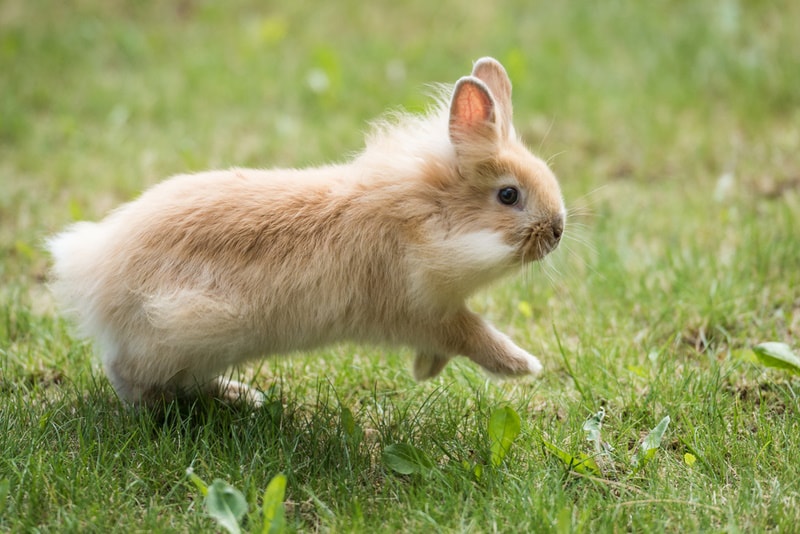
Temperament & Intelligence of the Lionhead Rabbit
Like most rabbits, Lionheads are energetic and playful and love socializing, but they can also be calm and docile after their exercise needs are met. They are generally good-natured but can also be skittish at times. They are an intelligent breed that can be litter trained and trained to do a few simple tricks.
Do These Rabbits Make Good Pets?👪
Lionhead rabbits make wonderful pets, but most dislike being picked up and held. Like most rabbits, they prefer their feet on the ground but enjoy a bit of petting and interactive playtime with their owners. They also make great pets for kids if they understand how to handle a rabbit gently.
Lionheads make suitable pets for singles, couples, families with kids, and first-time owners. They are a small breed suited to apartment living if they get taken outside to run around and get some sun.
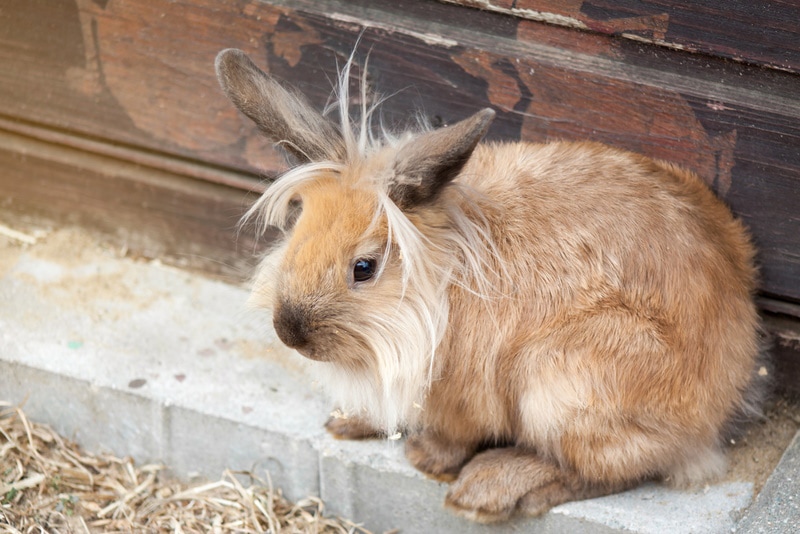
Does This Rabbit Get Along With Other Pets?
Lionhead rabbits get along with other pets as long as the pets are well-socialized and have been raised together. They are social rabbits, so it is ideal to have more than one. You can have rabbits of different sexes if they are neutered and spayed. Whichever pets you already have currently, a slow and safe introduction is vital for them to live together peacefully.
Things to Know When Owning a Lionhead Rabbit:
Caring for a Lionhead rabbit is a rewarding experience, and we’ll discuss the breed’s care requirements below, so you’ll be prepared to provide your new pet with the ideal environment.
Food & Diet Requirements🥕
Your Lionhead rabbit will need a diet of 70% good-quality hay such as Timothy hay, a variety of leafy greens, and a small number of rabbit pellets. You can pile the hay in your rabbit’s enclosure or use a hopper as long as hay is always available. Hay is an essential diet component that naturally wears your rabbit’s teeth down so they are less prone to dental issues. Greens and other fruit and veggies can be served in a dish to limit the amount they eat, and any leftovers should be removed before they get spoiled. Pellets can be fed to your rabbit in a small dish and should also be limited to prevent obesity and digestive issues. Generally, a ¼ cup of high-fiber pellets for every 5 pounds your rabbit weighs will suffice. Young rabbits can consume more pellets since their bodies are still developing and benefit from the extra nutrients.
Always ensure your rabbit has access to fresh water by using a bottle or dish that is always replenished. It is best to speak to your veterinarian about the best diet and portions for your Lionhead.
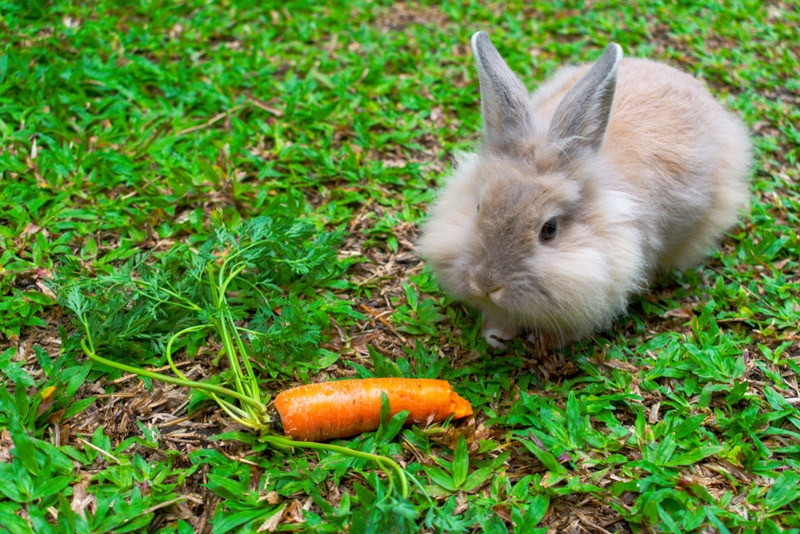
Habitat & Hutch Requirements🏠
Your Lionhead will need a spacious, comfortable, and safe hutch, regardless of whether it will be kept indoors or outdoors. It should be big enough for your rabbit to stretch, hop around and stand fully upright on its hind legs. Find a hutch with a solid floor because a wire floor can harm your rabbit’s feet, and ensure that it is weatherproof and protects your rabbit from the elements such as direct sun, rain, wind, and high temperatures.
There should be a dark and cozy space for your rabbit to retreat and sleep, a litter box, and toys. If your rabbit is outside, ensure that predators cannot get in the hutch and that it has a gate that locks. Elevating the hutch can deter some predators from entering. Your rabbit’s den must always stay clean, and fresh water should always be available.
Exercise & Sleeping Needs🐇
Your Lionhead requires playtime outside of the hutch, where it can hop around and safely explore. In the wild, they run about three miles a day, so you must keep your rabbit active. About 3–4 hours of playtime and exercise a day should suffice. Be sure to supervise your rabbit’s playtime and look for predators such as eagles and hawks. You can provide tunnels and platforms to hop on and off of, as well as balls and treat puzzles for a bit of mental stimulation.
Rabbits are primarily active at night, so you must provide a cozy, safe, and dark area for your rabbit to sleep where it can be undisturbed. You can also add soft straw for bedding, so your rabbit is warm and comfortable.
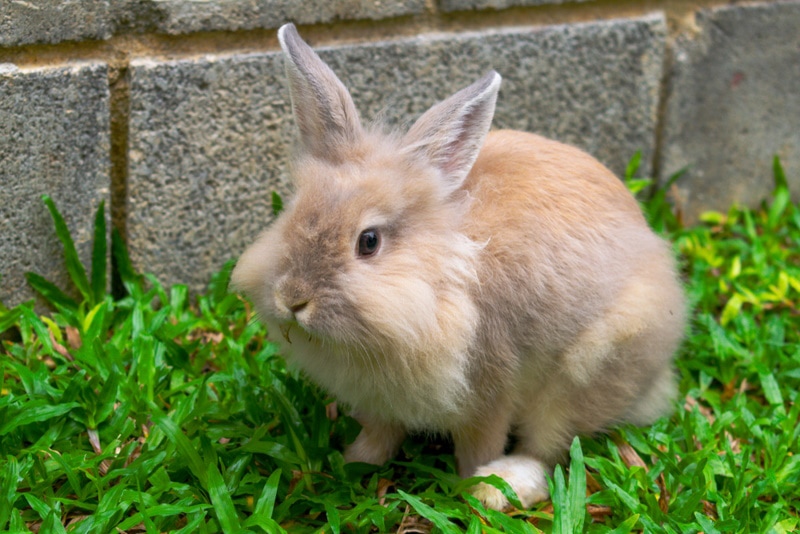
Training 🥎
Your Lionhead can be trained to use a litterbox, and they learn quickly compared to other rabbits. If you start training early and remain consistent, your rabbit will be litter box trained in no time. If you add hay to the litter box, you can encourage your pet to use it since they eat and defecate at the same time. You can also train your rabbit to do simple tricks and respond when you call its name.
Grooming✂️
Your Lionhead Rabbit won’t require too much grooming since they groom themselves, but regular brushing will remove loose fur, which can help prevent hairballs. You need to pay extra attention to their mane to help prevent knots and matting and be prepared for heavier shedding periods in the spring and fall.
It’s crucial to monitor your rabbit’s nails and teeth, ensuring they don’t get too long, and if your rabbit gets dirty, you can easily wipe it down with a damp cloth. Bathing is not recommended, and most rabbits are terrified of being bathed.
Lifespan and Health Conditions 🏥
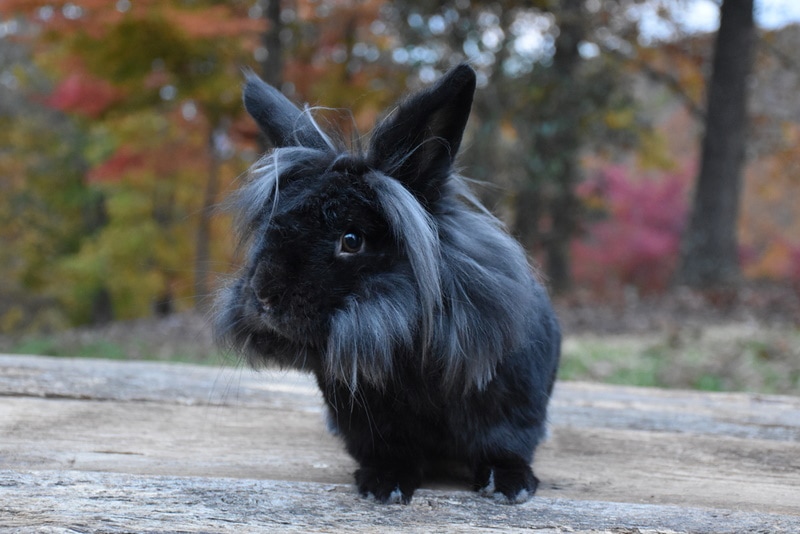
Lionhead rabbits have a long lifespan of 7–10 years. However, many factors influence their longevity. Like all rabbits, the Lionhead is prone to certain health conditions that every owner should know to provide the best care. Health issues can range from minor to severe, but with the correct preventative care and regular health check-ups, these issues can be prevented or caught early for proper treatment. Some health issues that can affect Lionheads include:
- Digestive issues
- Eye issues
- Malocclusion
- Ear mites
- Flystrike
- Uterine cancer
- Myxomatosis
- Rabbit hemorrhagic disease
Male vs Female
Male rabbits are known as buck’s, and female rabbits are known as doe’s, and examining their genitals is the only way to tell them apart. Generally, female Lionheads can be more aggressive during breeding time and toward their owners. They are more likely to bite or thump and are often more aloof, but this passes as you start to bond. Male rabbits are known to be calmer and a better choice for first-time owners. They are generally less territorial, more friendly, and affectionate.
Keeping your Lionhead Rabbit intact can also be a factor in its behavior. Intact rabbits are more sexually aggressive and prone to mounting, spraying, and humping, and intact males and females will need to stay separated. Spaying and neutering will help prevent the behavior and protect your rabbit from health issues such as uterine and testicular cancer.
3 Little-Known Facts About the Lionhead Rabbit
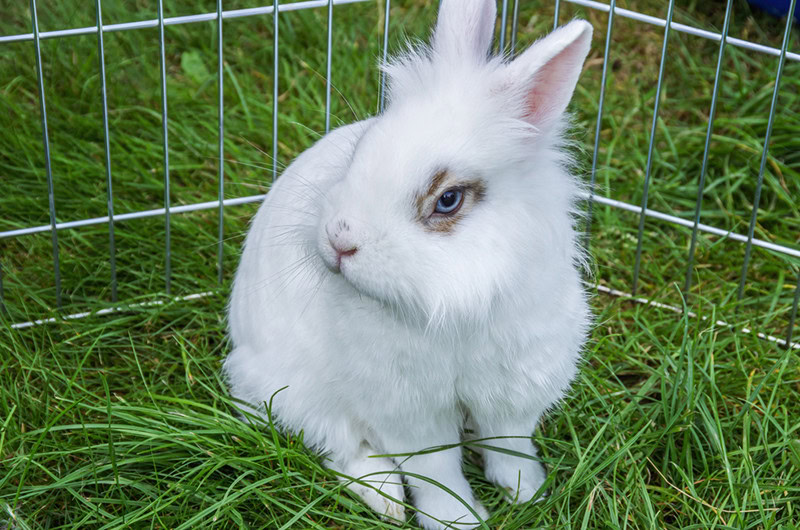
1. Lionhead Rabbits Have a Distinct Lion-like Mane Around Their Neck Due to the “Mane Gene.”
2. The Lionhead Rabbit Can Have a Single or Double Mane.
3. The Lionhead Rabbit Originated in Belgium
Final Thoughts
The Lionhead stands out with its adorable fluffy mane and calm temperament. While it is a relatively new breed, this little rabbit has quickly grown in popularity as a pet and a show rabbit. They are sociable, intelligent, and affectionate, and while they can be skittish at times, they still love to spend time with their owners. Lionheads are also energetic and require daily exercise and mental stimulation like any other rabbit. They need safe, comfortable housing, a high-quality diet, and minimal grooming. Lionheads are low-maintenance pets that will bond quickly with their owners if they provide loving homes.
Featured Image Credit: KanphotoSS, Shutterstock


